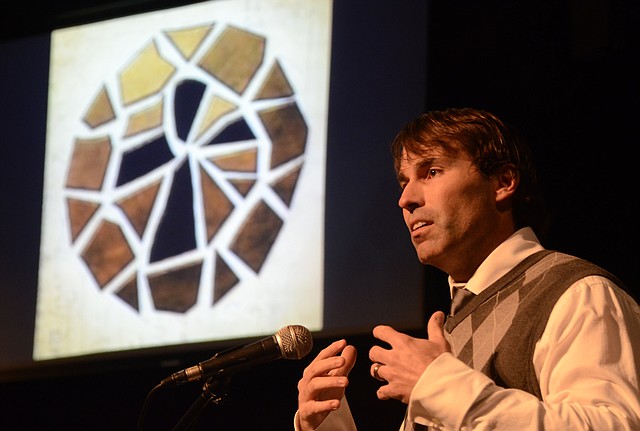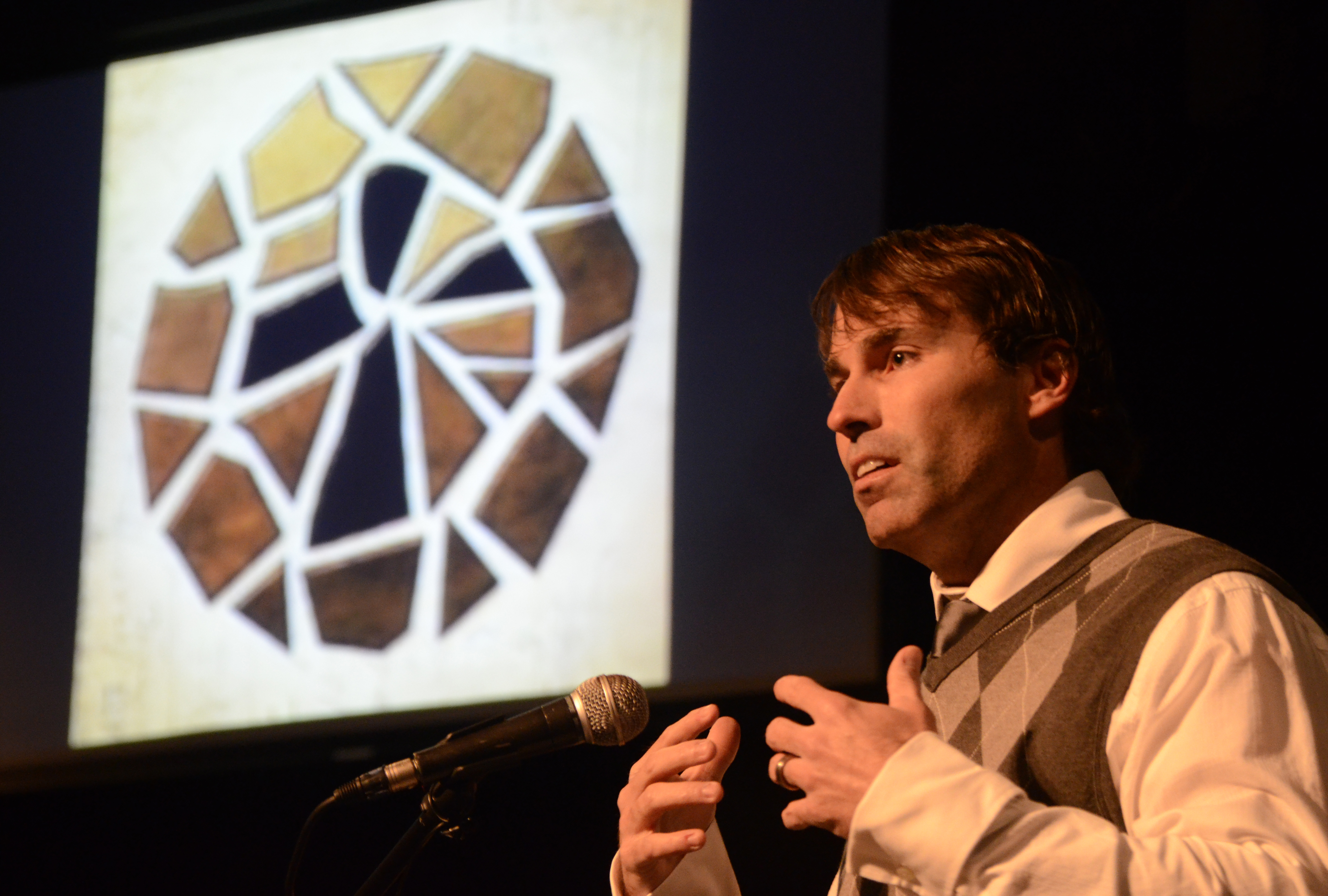Mosaic believes it's blazing a new trail to reach the lost
Sunday, January 1, 2012
ELSEWHERE ON THE WEBFor more information on Mosaic in Chattanooga go to www.mosaicartsvenue.com. For more information on Mosaic in California go to www.mosaic.org.
Parts of the two-story Mosaic church building on Market Street look like a church. A tall wall is hung with paintings of gold crosses, images of Jesus, messages from the Bible and dancing children. Chairs are set out in rows.
But look twice, and it could be something else altogether. The paint-sprayed concrete floors and dark walls. The bar in the back. The stage. A metal mold of a pregnant woman, her breasts bare.
The Mosaic church and its nightclub and teen outreach arm, Club Fathom, are many things to many people.
To the teens who come, the space is a haven for live shows and tight-quartered dancing. A spot to be seen. They are drawn by fliers depicting busty women and sometimes lewd slogans.
"Eighteen to enter, 21 to drink," fliers for Club Fathom read.
And when gunfire sprayed nearby last weekend after a Christmas party with 400 urban youths, the ministry became, to many city officials and downtown residents, a liability to be stopped.
But to the small church that organizes and works the events each week, the nightclub is a dangerous but needed youth outreach, a way to sell the Christian faith to the most troubled in Chattanooga.
"We would do anything to be relevant with the culture; the lost are that important to us," said Chris Edwards, the 30-year-old leadership pastor at Mosaic. "We believe God can use anything."
But some pastors, especially those trying to reach kids in urban neighborhoods, say there are lines churches shouldn't cross, even to relate to gang members.
"We want to make sure the main draw is Jesus, not because we are giving away free stuff or have these great programs," said Ronnie Perry, assistant pastor at New City Fellowship, a multiethnic Presbyterian church on Third Street that goes into the inner-city housing developments weekly.
A decade ago, Mosaic church started in Chattanooga as an offshoot of a larger, anti-traditional Christian movement in California.
At the time, churches nationally were hemorrhaging young people. In a post-modern world where people believed they could get to God in many ways, a pulpit message of sin, hell and damnation was falling out of vogue.
The Rev. Erwin McManus, who founded the first Mosaic in 1998 in Los Angeles, was originally a Southern Baptist pastor but wanted to build a church that could reach the young. He taught in jeans and a T-shirt and met with members in a building that doubled as a nightclub, Edwards said.
Eventually, the church became nondenominational and much more centered on artistic expression, with a simpler theology. Doctrines about baptism and communion - so essential to traditional Christian churches - were debatable to members, so those weren't included.
McManus and his followers wanted to emphasize the love and grace in the Bible, not the rules, Edwards said.
In six years, Mosaic in California grew from 100 to several thousand members whose average age was 25. And with its success, McManus pushed to spread the movement.
Sister communities were founded in San Francisco, Seattle, Manhattan, Atlanta, Nashville and Chattanooga, as well as in Germany, Spain and Scotland, according to an October 2004 article in The Los Angeles Times.
McManus, now in his early 50s, is a well-known author, arts promoter and speaker. He even sells a handbag line in Los Angeles and New York called McManus.
He has snagged big-name endorsements from people such as Rick Warren, leader of one of the nation's largest but more traditional churches, who calls McManus an innovator and a futurist.
The California pastor's message of cultural relevance appealed to Tim Reid, who started the Mosaic community in Chattanooga 10 years ago and calls himself a "mystic."
In 1993, Reid, a keyboardist and singer with a Christian hip-hop group called G.Q. Rude (for Godly Qualities Coming on Rude), tried to start a Christian dance club called Noah's Funky Ark on Ringgold Road, according to Times Free Press archives.
"A lot of kids in the church want to have a relationship with God, but it is hard," said Reid in a 1993 interview. "They want to have fun and usually end up in one of the clubs on Brainerd Road."
Reid considers McManus one of his mentors and they stay in regular contact, even as the city pressures the church to rein in its youth outreach activities.
After the shooting last weekend, McManus told church leaders he was surprised it hadn't happened sooner, Edwards said.
"We allow people to cuss and dress crazy," Edwards said. "We allow nearly anything. We are very liberal in what we allow. That is the most beautiful thing about the ministry. We don't make people change to come into our building."
Everyone who joins the Mosaic community is encouraged to work events at Club Fathom as volunteers. Church members take people's coats, make them non-alcoholic drinks at the bar, work the door, take care of the bands, monitor the crowd, man the sound system and enforce curfew.
Adam Vann, 32, has worked the sound equipment for nearly every Club Fathom event for four years. Before he was invited to visit the church in 2003 by a girlfriend, he had attended several secular rock shows.
He was raised in the church but had gone astray, he said: drinking, going to strip clubs, listening to music like Pantera and Slayer. But he wanted to get right. At Mosaic, he didn't feel as if he needed to change to come into God's presence and find Christian friends. People actually talked to him there, he said.
He eventually did change, he said. Now, at club events, he looks for openings in conversations to share his story.
Like other volunteer staff at the church, he believes God allows him to be above the temptations in the messages of the music or provocative dancing.
"We are very tough on our core on how we live," said Edwards. "We want to be squeaky-clean as possible."
Members try to show kindness to the bands, keep their eyes out for a lone girl crying about her boyfriend in a corner or a guy standing by himself not dancing.
"Sometimes I talk to them about depression," said Vann, who works full time as a store merchandiser. "I have prayed with people to come to Christ at the event or I just kick back and have fun with them."
Vann said he was nervous when the church agreed to host more events aimed at urban youth last year. Pastors said the gang crowd needed to be reached and other churches that hosted secular events, The Warehouse in Ringgold and the Camp House on Main Street, were appealing to the younger, whiter and more-educated crowds that had once come to Club Fathom events and art shows.
Church members call themselves radical. Even among the family of Mosaic churches, Edwards said the local church's methods are extreme. The organization and financial structure of the church also are complicated.
In a 2009 federal tax return, the most recent available, the nonprofit listed zero compensation for Reid, but listed a $5,557 expense account and other allowances. Since 2005, gifts, grants and contributions have declined from $91,408 a year to $34,906, according to tax records. Gross receipts for admission, merchandise or services decreased from $28,450 to $3,223.
County property records list Beverly Henry as owner of the building at 412 Market St.
Members and pastors say they are unpaid for their work. Reid runs a landscaping business and Edwards owns a martial arts studio. They say the cash cover charge at events, which can range from $5 to $15 or higher, depending on the band, goes to pay the live acts, electric and water bills and rent.
The church also rents space for art shows, weddings, music promotions and fraternity and sorority parties. Some events are strictly church events; others are secular events worked by church members.
Reid has said the club doesn't serve alcohol, even though advertisements for some events say adults can drink. He also says the church doesn't create the promotional material sent out, nor endorse the musicians who come.
"We are in the world but not of it," Reid said at a news conference last week. "God creates all forms of music. Man makes it evil."
More churches have experimented with new or controversial outreach methods as generational involvement in church wanes.
Millennials, young adults between 18 and 29, are much less likely to be affiliated with a faith, according to the Pew Forum for Religion and Public Life. Fifty-six percent of respondents to Pew's annual survey say they don't attend religious services.
Trying to reach young people, churches have opened playhouses and coffeeshops, held craft socials and poetry nights, sponsored concerts and rented movie theaters.
But other local pastors say most churches are using secular mediums to convey Christian, not secular, messages.
Perry said New City holds urban camps for inner-city youth with hip-hop music, but the artists are Christians.
"We do respect culture. We try to take an approach that, in any culture, the gospel is the key to crossing ethnic barriers," he said. "The ultimate goal is not how many people we can get through the door. We want them to see true life change."
New City holds weekly Bible studies in public housing projects and has programs to help families financially. Church leaders are upfront about their reason for reaching out: They want more people to know God.
Now, Perry said, New City has 1,000 members and multiple campuses; its congregation is 60 percent white, 30 percent black and 10 percent Hispanic.
Some other pastors think churches shouldn't be using any form of art or music that doesn't further Christian principles.
Patrick Hampton is a youth minister at Hawkinsville Baptist Church who mentors through Goodwill at several local schools.
Hampton started a ministry called the Mystery of Hip Hop. He travels to churches to explain how using hip-hop to reach inner-city youth doesn't work.
The violence, materialism, sexuality and misogyny encouraged by the music are everything Jesus preached against, he said.
"I think it is an oxymoron to use the hip-hop culture to reach youth for Jesus," he said.
"When you are using it as bait, it increases their appetite for it. Christ says we have to deny ourselves and the world and come to him," Hawkins said. "Hip-hop is one of those things that was created to oppose Christ and the principles of the Bible."
Staff writer Cliff Hightower contributed to this story.

